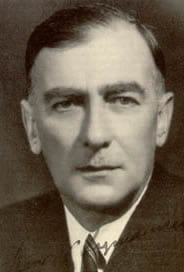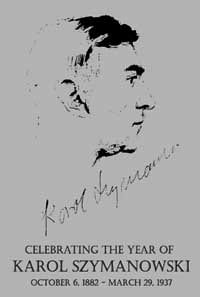Thursday, March 22, 2008 | 7:30 p.m.
Alfred Newman Recital Hall, USC (see AHF on campus map)
3616 Trousdale Pkwy, Los Angeles, CA
Reception following the concert
Admission is FREE and open to the public
Campus Parking: $7
Enter Gate 3 at Figueroa St. & McCarthy Way (Parking Structure X)
 The Polish Music Center at the USC Thornton School of Music announces a special concert “Szymanowski and Modern Music in Poland ” on Thursday, March 22, 7:30 p.m., at Newman Recital Hall on the USC Campus. Performers for this event, which celebrates the 70th anniversary of Szymanowski’s death, include pianists Susan Svrček and Yevgeniy Milyazskiy, violinist Pasha Tseitlin, cellist Yao Wang and the Los-Angeles based wind quintet, Midnight Winds. The program highlights include Szymanowski’s Violin Concerto No. 1 as well as a selection of works by Grażyna Bacewicz, Wojciech Kilar, Zygmunt Krauze, Witold Lutosławski, and Artur Malawski.
The Polish Music Center at the USC Thornton School of Music announces a special concert “Szymanowski and Modern Music in Poland ” on Thursday, March 22, 7:30 p.m., at Newman Recital Hall on the USC Campus. Performers for this event, which celebrates the 70th anniversary of Szymanowski’s death, include pianists Susan Svrček and Yevgeniy Milyazskiy, violinist Pasha Tseitlin, cellist Yao Wang and the Los-Angeles based wind quintet, Midnight Winds. The program highlights include Szymanowski’s Violin Concerto No. 1 as well as a selection of works by Grażyna Bacewicz, Wojciech Kilar, Zygmunt Krauze, Witold Lutosławski, and Artur Malawski.
The year 2007 was officially proclaimed the “Year of Karol Szymanowski” by the Ministry of Culture and National Heritage of Poland. The occasion is the 70th anniversary of Szymanowski’s death on March 29 and the 125th anniversary of his birth, falling on October 6.
Karol Szymanowski (1882-1937) was one of the greatest modern Polish composers. Building upon the achievements of Chopin and Moniuszko, he ushered Polish music into the twentieth century. While studying composition in Warsaw at the turn of the century, Szymanowski had made friends with several young composers like Ludomir Różycki and Apolinary Szeluto, and performers like Artur Rubinstein and Paweł Kochański. With Szymanowski at the center, this group became widely known as Młoda Polska [Young Poland], whose concerts were an important part of this newly-emerging modernist artistic movement in Poland.
Szymanowski’s artistic achievements, widely praised throughout Europe during his lifetime, were of utmost importance for the successive generations of Polish composers. His keen interest in modern European music coupled with his sensitivity to Polish national idioms gave a clear and lasting example for his younger colleagues to follow. Music by Grażyna Bacewicz (1909-1969), Wojciech Kilar (b. 1932), Zygmunt Krauze (b. 1938), Artur Malawski (1904-1957) and Witold Lutosławski (1913-1994) would not have been possible without Szymanowski’s creative example (pictured above in that order). Like their predecessor, these composers skillfully combined the elements of the European neo-classical tradition with unmistakably Polish national characteristics. Because of Szymanowski’s leadership in taking Polish music away from the obsolete and provincial nineteenth century stereotypes, he is universally recognized today as the father of modern Polish music, whose role in securing the success of contemporary Polish music was essential.
Performers:
Susan Svrček, piano
Yevgeniy Milyazskiy, piano
Pasha Tseitlin, violin
Yao Wang, cello
Midnight Winds, wind quintet
Program highlights:
Szymanowski: Violin Concerto no. 1
Kilar: Quintet for Wind Instruments
Lutosławski: Sacher Variations
Bacewicz: Second Piano Sonata
Szymanowski & Modern Polish Music
From February 2010 PMC Newsletter
The Polish Music Center will be honoring this year’s Szymanowski anniversary with a special concert, “Szymanowski & Modern Polish Music,” on March 22nd at 7:30pm . The concert will take place in Alfred Newman Hall at the University of Southern California. Performers will include both USC students and professional artists from the area. The program will feature major works by Symanowski as well as works by composers who followed his lead, ushering Polish music into the modern era.
Polish Music Center Concert
From March 2010 PMC Newsletter
The Polish Music Center will be honoring this year’s Szymanowski anniversary with a special concert, “Szymanowski and Modern Music in Poland,” on March 22nd at 7:30pm. The concert will take place in Alfred Newman Hall at the University of Southern California. Performers will include Susan Svrček & Yevgeniy Milyazskiy, pianists; Pasha Tseitlin, violin; Yao Wang, cello; and Midnight Winds, brass/woodwind quintet. The program will feature major works by Symanowski, including the First Violin Concerto, as well as works by composers like G. Bacewicz, W. Lutoslawski and Z. Krauze who followed his lead, giving Polish music great success and prestige in the modern era.
Szymanowski and Modern Music In Poland
From April 2010 PMC Newsletter
Review by Barbara Kraft

The Polish Music Center at the USC Thornton School of Music inaugurated an anniversary celebration of Karol Szymanowski’s music with an invigorating and enthusiastically-received concert in Newman Hall Thursday, March 22. The first half of the concert was devoted to the music of Szymanowski, the great modern composer who ushered Polish music into the 20th century; the second half to the music of five Polish composers, all of whom were born in the twentieth century and influenced by Szymanowski’s artistic achievements: Grażyna Bacewicz (1909-1969), Wojciech Kilar (b. 1932), Zygmunt Krauze (b. 1938), Witold Lutoławski (1913-1994), and Artur Malawski (1904– 1957).
The concert opened with violinist Paul Tseitlin’s sensitive rendering of Szymanowski’s La Berceuse d’Aïtacho Enia, Op. 52. This was followed by a cliff-hanging performance of Szymanowski’s Concerto No. 1 for Violin and Orchestra, Op. 35 played by Mr. Tseitlin and the 23-year-old, Belarus-born pianist Yevgeniy Milyavskiy. The chemistry between the two young performers crackled with visceral energy. Mr. Milyavskiy’s forceful mastery of the piano reduction demanded the listener imagine the sheer orchestral volume of the brass, the basses, the percussion, especially in the final section of the concerto – Allegro assai.
The second half of the concert opened with cellist Yao Wang playing Lutoławski’s Sacher Variations and the Midnight Winds giving the West Coast premiere of Wojciech Kilar’s Quintet for Winds. It closed with a brilliant performance by Susan Svrček, a specialist in new piano music and founding member of the Piano Spheres concert series. Ms. Svrček’s reading of the Grażyna Bacewicz’s Second Sonata for Piano written in 1953 was pure story-telling, utilizing a language of amazing virtuosity, subtlety of touch and phrasing, and dramatic variations in tempi and dynamics.
During his lifetime Szymanowski enjoyed considerable international renown and his music was performed and widely praised throughout Europe. At home he was less fortunate – his embrace of modernity was eschewed by audiences and critics immured in nineteenth century aesthetics. History also had a hand in preventing a reassessment of Szymanowski’s artistic stature in Poland. His death on the eve of World War II and the subsequent devastation of Poland and her cultural heritage was followed, in 1981, by the declaration of martial law in Poland by the Communist government. To quote Isaiah: “The race is not given to the swift nor favor to the wise, but all things depend on time and chance.” Time and chance finally caught up with Szymanowski this year when the Ministry of Culture and National Heritage of Poland proclaimed 2007 the “Year of Karol Szymanowski.” We can only hope that his music finally takes its rightful place in the concert repertoire.
Barbara Kraft is a public relations specialist and producer, writer and narrator of KCRW’s hour-long documentary on Segerstrom Hall, “Transforming O.C.” Ms. Kraft’s other recent projects include hosting two of KCRW’s Politics of Culture programs, on the Los Angeles Opera’s production of Kurt Weill and Berthold Brecht’s The Rise and Fall of the City of Mahagonny, and on the Los Angeles Opera’s “Recovered Voices – A Lost Generation’s Long Forgotten Masterpieces” project.




